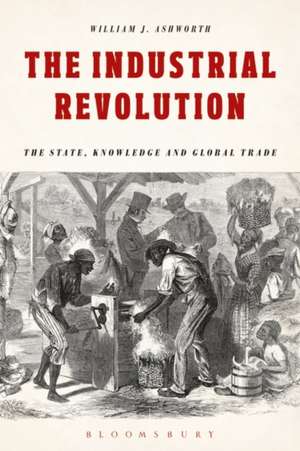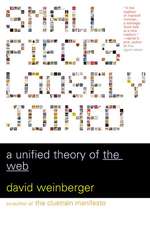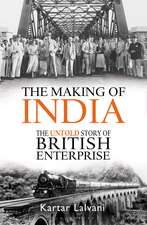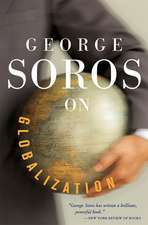The Industrial Revolution: The State, Knowledge and Global Trade
Autor William J. Ashworthen Limba Engleză Paperback – 25 ian 2017
| Toate formatele și edițiile | Preț | Express |
|---|---|---|
| Paperback (1) | 182.22 lei 3-5 săpt. | +50.41 lei 7-11 zile |
| Bloomsbury Publishing – 25 ian 2017 | 182.22 lei 3-5 săpt. | +50.41 lei 7-11 zile |
| Hardback (1) | 715.73 lei 6-8 săpt. | |
| Bloomsbury Publishing – 25 ian 2017 | 715.73 lei 6-8 săpt. |
Preț: 182.22 lei
Preț vechi: 209.72 lei
-13% Nou
Puncte Express: 273
Preț estimativ în valută:
34.87€ • 36.57$ • 29.03£
34.87€ • 36.57$ • 29.03£
Carte disponibilă
Livrare economică 11-25 martie
Livrare express 25 februarie-01 martie pentru 60.40 lei
Preluare comenzi: 021 569.72.76
Specificații
ISBN-13: 9781474286466
ISBN-10: 1474286461
Pagini: 352
Dimensiuni: 156 x 234 x 19 mm
Greutate: 0.52 kg
Editura: Bloomsbury Publishing
Colecția Bloomsbury Academic
Locul publicării:London, United Kingdom
ISBN-10: 1474286461
Pagini: 352
Dimensiuni: 156 x 234 x 19 mm
Greutate: 0.52 kg
Editura: Bloomsbury Publishing
Colecția Bloomsbury Academic
Locul publicării:London, United Kingdom
Caracteristici
Convincingly advances the argument that the British industrial revolution is a story of illiberalism, protectionism, state regulation and military efficiency
Notă biografică
William J. Ashworth is Senior Lecturer in History at the University of Liverpool, UK. He is the author of Customs and Excise: Trade, Production and Consumption in England, 1640-1845 (2003).
Cuprins
Introduction1. Trade, Finance and European War2. "The Greatest Dominion of the World": Trade and Textiles3. Silver and Slaves: Britain and the Atlantic World4. South Asian "Weeds": The Balance of Trade and Textiles5. British State Protection and Industrial Development6. The State as Arbiter of Production7. Balancing Tax and Industry: The Regulation and Taxing of Domestic Manufactures8. Culture, Textile Design and Quality9. Technological Innovation in Cotton Textiles, Metals, Energy and Steam10. Industry and Fiscal Pressure11. Industry and the Lived Experience: Food and Labour12. The Rise of Political Economy during the British Industrial RevolutionEpilogueBibliography
Recenzii
This is an excellent book, ideal for lively debates in graduate seminars. It combines impressive research with a convincing argument that expands the chronological and contextual boundaries traditionally associated with the Industrial Revolution. It is a welcome intervention in the historiography.
The author demonstrates convincingly that state policy, driven by the increasing demands for state revenue, played a critical role in determining Britain's industrial turn . Ashworth's The Industrial Revolution should be required reading for anyone who wishes to understand industrialization and the role of the state more clearly. Summing Up: Highly recommended. Upper-division undergraduates and above.
This refreshing book is a welcome antidote to those histories of the Industrial Revolution written during the Cold War ... This is a major study in a different mould, which provides a new understanding of the Industrial Revolution and the role and dynamics of the state that lay behind it.
This is a brilliant, daring, and thoroughly researched book. Its originality rests on Ashworth's remarkable capacity to link commercial and political history to the history of science in the making of the industrial revolution. Ashworth calls into question the claim that a unique scientific culture underpinned Britain's early industrial ascendancy. Moreover, he emphasizes the role of the British state and its industrial policies rather than "free markets" in providing an effective context for industrial change. In doing so, he knits together commercial expansion, the protectionist and regulatory practices of the state, and the transformation of British technology in a highly compelling manner.
Every decade or so a book comes out that forces historians to reinterpret fundamentally Britain's Industrial Revolution. This is such a book. Ashworth combines deep and even dense scholarship with fearless and sweeping interpretation, and though he is not the first to focus on the period after the Glorious Revolution, instead of prioritizing finance, commerce, or consumption, he argues that it was Britain's interventionist state and associated mercantilist controls that boosted Britain's productivity and created her manufacturing pre-eminence. It follows that, far from creating the industrial revolution, Adam Smith's market theory and free trade political economy were only possible because of it. All in all, a tour de force.
Historians have long debated the nature of the British Industrial Revolution, and their debates have invariably had profound implications for the way we view the present. Every so often, a book comes along that reframes the terms of this debate. The Industrial Revolution: The State, Knowledge and Global Trade is such a book. Ashworth's narrative combines vast synthesis with profound research. Marshaling an enormous range of secondary source material, and interrogating that historiography with his own deep archival knowledge, Ashworth succeeds in producing that rare effect: a historical gestalt shift. Those who read and digest this book will come away with a radically new perspective.
The author demonstrates convincingly that state policy, driven by the increasing demands for state revenue, played a critical role in determining Britain's industrial turn . Ashworth's The Industrial Revolution should be required reading for anyone who wishes to understand industrialization and the role of the state more clearly. Summing Up: Highly recommended. Upper-division undergraduates and above.
This refreshing book is a welcome antidote to those histories of the Industrial Revolution written during the Cold War ... This is a major study in a different mould, which provides a new understanding of the Industrial Revolution and the role and dynamics of the state that lay behind it.
This is a brilliant, daring, and thoroughly researched book. Its originality rests on Ashworth's remarkable capacity to link commercial and political history to the history of science in the making of the industrial revolution. Ashworth calls into question the claim that a unique scientific culture underpinned Britain's early industrial ascendancy. Moreover, he emphasizes the role of the British state and its industrial policies rather than "free markets" in providing an effective context for industrial change. In doing so, he knits together commercial expansion, the protectionist and regulatory practices of the state, and the transformation of British technology in a highly compelling manner.
Every decade or so a book comes out that forces historians to reinterpret fundamentally Britain's Industrial Revolution. This is such a book. Ashworth combines deep and even dense scholarship with fearless and sweeping interpretation, and though he is not the first to focus on the period after the Glorious Revolution, instead of prioritizing finance, commerce, or consumption, he argues that it was Britain's interventionist state and associated mercantilist controls that boosted Britain's productivity and created her manufacturing pre-eminence. It follows that, far from creating the industrial revolution, Adam Smith's market theory and free trade political economy were only possible because of it. All in all, a tour de force.
Historians have long debated the nature of the British Industrial Revolution, and their debates have invariably had profound implications for the way we view the present. Every so often, a book comes along that reframes the terms of this debate. The Industrial Revolution: The State, Knowledge and Global Trade is such a book. Ashworth's narrative combines vast synthesis with profound research. Marshaling an enormous range of secondary source material, and interrogating that historiography with his own deep archival knowledge, Ashworth succeeds in producing that rare effect: a historical gestalt shift. Those who read and digest this book will come away with a radically new perspective.














